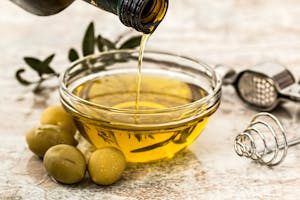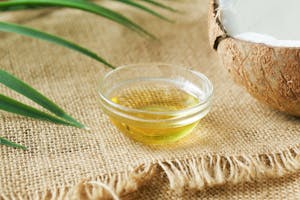 When managing your cholesterol through diet, the types of fats and oils you cook with can make a significant difference. Choosing oils with high amounts of unhealthy saturated and trans fats can spike your “bad” LDL cholesterol, increasing your risk for high cholesterol and heart disease. On the other hand, oils high in heart-healthy monounsaturated or polyunsaturated fats can help lower LDL and maintain healthy cholesterol screening levels.
When managing your cholesterol through diet, the types of fats and oils you cook with can make a significant difference. Choosing oils with high amounts of unhealthy saturated and trans fats can spike your “bad” LDL cholesterol, increasing your risk for high cholesterol and heart disease. On the other hand, oils high in heart-healthy monounsaturated or polyunsaturated fats can help lower LDL and maintain healthy cholesterol screening levels.
So when you’re shopping for cooking oil, what are the best and worst options for your cholesterol? Read on to learn which cooking oils you should embrace and avoid if you’re watching your cholesterol and seeking to make heart-healthy choices.
How Cooking Oils Impact Cholesterol
Before getting into specific oils, it helps to know a little about dietary fats and cholesterol. Cholesterol is a form of fat with a waxy consistency that is found in your blood. Your body needs it to construct healthy cells, but having high cholesterol can raise your risk for heart disease.
LDL cholesterol is dubbed the “bad” type because it contributes to fatty buildup in your arteries. But HDL cholesterol helps eliminate LDL cholesterol from your blood vessels.
All cooking oils contain a blend of saturated, monounsaturated, and polyunsaturated fatty acids. Saturated fat has been connected with higher levels of LDL cholesterol. Meanwhile, monounsaturated and polyunsaturated fats help reduce LDL and increase HDL cholesterol.
So when cooking for healthy cholesterol screening levels, oils higher in monounsaturated and polyunsaturated fats are ideal. You’ll also want to avoid oils high in saturated and trans fats to help keep your LDL cholesterol down.
The Best Cooking Oils for Cholesterol
Here are five of the top cholesterol-friendly cooking oils and how to use them:
Olive Oil
 Thanks to its heart-healthy monounsaturated fats, olive oil is a smart choice for managing cholesterol. Extra virgin olive oil also contains antioxidants such as oleocanthal that may help reduce inflammation tied to LDL cholesterol oxidation.
Thanks to its heart-healthy monounsaturated fats, olive oil is a smart choice for managing cholesterol. Extra virgin olive oil also contains antioxidants such as oleocanthal that may help reduce inflammation tied to LDL cholesterol oxidation.
With its subtle peppery flavor and medium-high smoke point, olive oil works wonderfully for light sautéing, baking, and dressings. Sprinkle a tablespoon or two over vegetables before roasting for a healthy, flavorful choice.
Sesame Oil
Sesame oil contains a compound called sesamin that may help lower LDL cholesterol. In one study, using sesame oil regularly for 90 days significantly improved blood sugar and cholesterol levels in people with diabetes.
Look for unrefined sesame oil to get the most cholesterol-lowering benefits. Sesame oil has a medium-high smoke point, so it’s great for stir-frying veggies and making Asian-inspired dishes.
Walnut Oil
Plant-based walnut oil contains a high concentration of alpha-linolenic acid (ALA), an anti-inflammatory omega-3 fatty acid that may protect your arteries and lower LDL cholesterol.
Because heat can break down its nutrients, cold-pressed walnut oil is best saved for cold preparations such as salad dressings and drizzles. But it adds tremendous flavor and heart-healthy perks.
Canola Oil
Canola oil gets a bad rap, yet it contains less saturated fat than any other oil frequently used in cooking. One study found that swapping other fats for canola oil reduced LDL cholesterol by about 5%.
Thanks to its neutral flavor and high smoke point, canola oil works well for everyday light sautéing, baking, stir-fries, and grilling. Look for non-GMO canola oil whenever possible.
Avocado Oil
Over 70% of avocado oil consists of LDL cholesterol-lowering monounsaturated fat. This green fruit oil also contains lutein, an antioxidant that helps prevent cholesterol from becoming oxidized and damaging your arteries.
Avocado works beautifully for pan-searing meats or fries, stir-frying veggies, and oven roasting. Its mild flavor also makes it versatile for baking desserts and dressings.
Cooking Oils to Limit for High Cholesterol
Oils high in saturated and trans fats directly raise LDL cholesterol. Limiting these cholesterol-raising oils is just as important as utilizing healthier options in your cooking. Here are four of the worst oils for your cholesterol:
Coconut Oil
 All the rage for its health halo, coconut oil is actually packed with artery-clogging saturated fat that adversely affects your cholesterol profile. Over 83% of the fat in coconut oil is saturated, which exceeds butter’s saturated fat profile.
All the rage for its health halo, coconut oil is actually packed with artery-clogging saturated fat that adversely affects your cholesterol profile. Over 83% of the fat in coconut oil is saturated, which exceeds butter’s saturated fat profile.
So while the occasional bit of virgin coconut oil likely won’t hurt, routine use is not heart-smart. Save this tropical oil for special occasions versus everyday cooking when managing cholesterol through diet.
Palm Oil
Found in many processed foods from baked goods to instant ramen, palm oil negatively impacts LDL cholesterol levels even more than coconut oil. Palm oil contains roughly 50% saturated fat.
Checking ingredient labels and avoiding products with palm oil can help control cholesterol intake from processed foods. Trans fat-free vegetable oil spreads are better alternatives than palm oil-based shortening or margarines.
Partially Hydrogenated Oil
To give processed foods a longer shelf life, manufacturers often add partially hydrogenated oil, a source of trans fats that are much worse for cholesterol levels than saturated fats. Trans fats both raise LDL and lower HDL cholesterol significantly.
Thankfully, a U.S. ban on artificial trans fats means partially hydrogenated oils are being phased out of foods. But in the meantime, avoid products listing partially hydrogenated oils, including many microwave popcorn brands and frozen pizzas.
Lard and Tallow
From pie crusts to tamales, these animal-based saturated fats are go-tos for certain recipes. However, both lard and tallow can negatively impact cholesterol levels, with lard containing 39% saturated fat and beef tallow 50%.
Rather than nix traditional recipes, you can tweak them to be healthier. Try using a plant oil and vegetable shortening combo instead of all lard for flakier pie crust. Or substitute a little bacon grease for lard in tamales for flavor.
Schedule Your Cholesterol Screening Today
If you are concerned that your current cholesterol levels are putting your health at risk, Imperial Center Family Medicine is here to help. Our compassionate physicians provide complete cholesterol screenings and treatment plans customized to your needs. Contact us today at 919-873-4437 or online to schedule your cholesterol screening.
